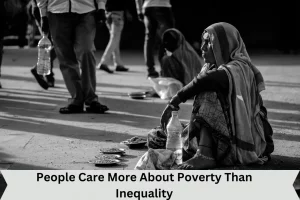ForumIAS announcing GS Foundation Program for UPSC CSE 2025-26 from 19 April. Click Here for more information.
Source: This post people care more about poverty than inequality has been created, based on the article “Don’t Lose Sleep Over Inequality” published in “The Times of India” on 2nd April 2024.
UPSC Syllabus Topic: GS Paper 1- Society-poverty and developmental issues,
News: The article discusses how people care more about poverty than inequality. It explains that inequality doesn’t bother most people unless it affects them personally and argues that reducing poverty is more important than reducing inequality in developing countries. People Care More About Poverty Than Inequality
For details information on Gini coefficient read here
What does the Gini Coefficient show about India?
Gini Coefficient Increase: In India, the Gini coefficient, a measure of inequality, increased from 0.30 in 1993-94 to 0.36 in 2011-12.
Rising Inequality: This rise indicates a growth in income or wealth inequality over the years.
Contrast with Poverty Reduction: While the Gini coefficient rose, indicating higher inequality, India also saw a significant reduction in extreme poverty during the same period.
Why do people care more about poverty than inequality?
Personal Impact: People are more affected by their immediate financial situation, like poverty, rather than abstract concepts of national or global inequality.
Awareness: The general public is often unaware of the technical measures of inequality, like the Gini coefficient.
Economic Priorities: In developing countries like India, the focus is more on wealth creation and escaping poverty, as demonstrated by the significant reduction in extreme poverty alongside rising inequality.
Why is wealth creation important?
Poverty Reduction: Wealth creation is crucial for reducing poverty, as seen in India’s progress where extreme poverty significantly declined alongside economic growth.
Economic Growth: When wealth is generated, it contributes to overall economic development, benefiting society broadly.
Wealth Disparity: As wealth is created, even if the wealthy retain a small portion, their share of total wealth can increase, as evidenced by the rise of billionaires in India.
Investment and Entrepreneurship: Wealthy individuals often invest in high-return ventures, promoting economic activity.
What is the problem with wealth Tax?
Discouraging Investment: A heavy wealth tax could deter wealthy individuals from investing in high-return ventures, vital for economic growth.
Impact on Entrepreneurship: Such a tax might discourage new entrepreneurship, particularly important for first-generation entrepreneurs.
Government Efficiency: There’s a risk that wealth managed by the government may not be as effectively invested as in private hands.
Economic Growth: Overall, a hefty wealth tax could potentially slow down economic growth and innovation.
Question for practice:
Discuss why people tend to prioritize poverty reduction over addressing inequality, particularly in developing countries like India.





